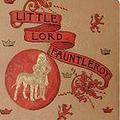Chapter 6 (5)
The proud, angry old man thought he had kept all his thoughts secret. He did not suppose any one had dared to guess at, much less talk over what he felt, and dreaded; but his servants watched him, and read his face and his ill-humors and fits of gloom, and discussed them in the servants' hall. And while he thought himself quite secure from the common herd, Thomas was telling Jane and the cook, and the butler, and the housemaids and the other footmen that it was his opinion that "the hold man was wuss than usual a-thinkin' hover the Capting's boy, an' hanticipatin' as he won't be no credit to the fambly. An' serve him right," added Thomas; "hit's 'is hown fault. Wot can he iggspect from a child brought up in pore circumstances in that there low Hamerica?" And as the Reverend Mr. Mordaunt walked under the great trees, he remembered that this questionable little boy had arrived at the Castle only the evening before, and that there were nine chances to one that his lordship's worst fears were realized, and twenty-two chances to one that if the poor little fellow had disappointed him, the Earl was even now in a tearing rage, and ready to vent all his rancor on the first person who called—which it appeared probable would be his reverend self. Judge then of his amazement when, as Thomas opened the library door, his ears were greeted by a delighted ring of childish laughter.
"That's two out!" shouted an excited, clear little voice. "You see it's two out!" And there was the Earl's chair, and the gout-stool, and his foot on it; and by him a small table and a game on it; and quite close to him, actually leaning against his arm and his ungouty knee, was a little boy with face glowing, and eyes dancing with excitement. "It's two out!" the little stranger cried. "You hadn't any luck that time, had you? "—And then they both recognized at once that some one had come in. The Earl glanced around, knitting his shaggy eyebrows as he had a trick of doing, and when he saw who it was, Mr. Mordaunt was still more surprised to see that he looked even less disagreeable than usual instead of more so. In fact, he looked almost as if he had forgotten for the moment how disagreeable he was, and how unpleasant he really could make himself when he tried.
"Ah!" he said, in his harsh voice, but giving his hand rather graciously. "Good-morning, Mordaunt. I've found a new employment, you see." He put his other hand on Cedric's shoulder,—perhaps deep down in his heart there was a stir of gratified pride that it was such an heir he had to present; there was a spark of something like pleasure in his eyes as he moved the boy slightly forward. "This is the new Lord Fauntleroy," he said. "Fauntleroy, this is Mr. Mordaunt, the rector of the parish." Fauntleroy looked up at the gentleman in the clerical garments, and gave him his hand.
"I am very glad to make your acquaintance, sir," he said, remembering the words he had heard Mr. Hobbs use on one or two occasions when he had been greeting a new customer with ceremony. Cedric felt quite sure that one ought to be more than usually polite to a minister.
Mr. Mordaunt held the small hand in his a moment as he looked down at the child's face, smiling involuntarily. He liked the little fellow from that instant—as in fact people always did like him. And it was not the boy's beauty and grace which most appealed to him; it was the simple, natural kindliness in the little lad which made any words he uttered, however quaint and unexpected, sound pleasant and sincere. As the rector looked at Cedric, he forgot to think of the Earl at all. Nothing in the world is so strong as a kind heart, and somehow this kind little heart, though it was only the heart of a child, seemed to clear all the atmosphere of the big gloomy room and make it brighter.
"I am delighted to make your acquaintance, Lord Fauntleroy," said the rector. "You made a long journey to come to us. A great many people will be glad to know you made it safely." "It WAS a long way," answered Fauntleroy, "but Dearest, my mother, was with me and I wasn't lonely. Of course you are never lonely if your mother is with you; and the ship was beautiful." "Take a chair, Mordaunt," said the Earl. Mr. Mordaunt sat down. He glanced from Fauntleroy to the Earl.
"Your lordship is greatly to be congratulated," he said warmly. But the Earl plainly had no intention of showing his feelings on the subject.
"He is like his father," he said rather gruffly. "Let us hope he'll conduct himself more creditably." And then he added: "Well, what is it this morning, Mordaunt? Who is in trouble now?"

